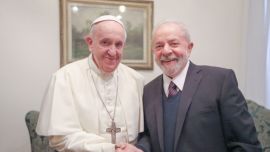For a leader who rose to Argentina’s top job by touting radical proposals and showing little willingness to negotiate with the country’s “political elite,” Javier Milei is turning into quite the pragmatist.
In the latest about face, his government on Monday scrapped plans to privatize oil producer YPF SA, while proposing only partial sales of other state-owned firms, including nuclear power generator Nucleoeléctrica, Banco Nación and satellite company Arsat.
Milei’s radical persona has remained on full display at public events. Just last week, he devoted an entire speech at the World Economic Forum in Davos to warnings about the dangers of socialism, without mentioning Argentina’s own problems.
In private, however, his delegation was trying to charm business leaders into investing in the country. And with his so-called 'omnibus' package of 600 reform measures facing an uphill battle in an opposition-controlled Congress, the libertarian president has found himself forced to bargain.
Since coming home from the Swiss Alpine resort, Milei has agreed to make changes to more than 100 measures in the 'Omnibus Bill,' which was primarily designed to reduce spending and deregulate several economic sectors.
While the YPF decision may be part of a strategy to protect its assets from seizure by creditors, others are more clearly designed to win over lawmakers and secure the plan’s passage despite his party’s slim minority.
Milei altered the bill to increase pension payments in line with monthly inflation, after previously refusing to commit to any particular adjustment. He also tweaked a controversial proposal to give himself emergency powers to set policy on economic, social and defense matters for up to four years — his entire mandate. Now, the emergency powers request no longer applies to social and defence issues, and is limited to two years at most.
Milei’s newfound willingness to negotiate is all the more meaningful considering that just last year he was floating the idea of a popular referendum should Congress repeal his proposals. It suggests a less confrontational approach that may be key for the success of his plans.
“I don’t think anyone seriously thought it possible that the government would be given full discretion to privatise assets or that YPF and Banco Nación would be among assets that would be privatised,” said Patrick Esteruelas, Emso Asset Management’s global head of research. “If this ends up being the ultimate price to preserve the main fiscal pillars of the government’s proposal, I would call it very good news.”
The changes to the Omnibus Bill resulted from hours of closed-door negotiations, as well as public hearings held over the past few weeks, although Milei denies that he was pressured into making them.
“We didn’t concede on anything,” he said Monday morning in an interview with radio station Rock&Pop. “There are improvements. If someone proposes an improvement, we accept it.”
Pragmatism, or no other option
It remains to be seen whether Milei’s policy reversals on privatisations and pension payments will be enough to appease public workers, who are this week set to stage a national strike against his austerity drive. But it’s not the first time Milei has backtracked on major policy pledges — or at least delayed them until a more opportune moment materialises.
His promise to introduce the dollar as legal tender in Argentina — touted during the campaign as a solution to its inflation crisis — was put on the back burner after he ditched dollarisation guru Emilio Ocampo to pick Luis Caputo as his economic czar.
Caputo, who previously served as finance minister under former president Mauricio Macri, then launched a classic austerity programme to attack the real causes of Argentina’s chronic inflation, promising that dollarisation would be considered at the right moment. Argentina’s Central Bank, which Milei had promised to “burn down” once in office, continues to operate at least until then.
Milei’s foreign policy also required crucial adjustments. As a candidate, he didn’t think twice before calling the Chinese “assassins” and describing Mercosur — the South American trade bloc that includes Argentina — as a “customs union of poor quality.”
Once in office, he handed Foreign Minister Diana Mondino the task of patching up relations with China, a top destination for Argentina’s agricultural exports, and with Mercosur.
by Manuela Tobias, Bloomberg






















Comments